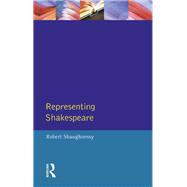Representing Shakespeare
, by Robert Shaughnessy- ISBN: 9780133429404 | 0133429407
- Cover: Nonspecific Binding
- Copyright: 7/15/2014
Following the work of the Royal Shakespeare Company over three decades, Representing Shakespeare traces the changing theatrical and cultural identity of the history plays in the context of post-war social and political conflict, war, crisis and change. In this new study, Shakespeare's plays in performance are seen as part of a wider cultural history. Traditional theatre history and performance criticism has largely excluded politics and social history, isolating the theatre production as an interpretive act without taking into account its social and ideological contexts. This book examines the enduring appeal and potency of the history plays, showing how these stories have been repeatedly reinvented by the RSC as narratives of individual self-definition and self-discovery.
Since the inception of the Royal Shakespeare Company in the 1960s, the company's commitment to relevance has fostered close relationships between Shakespearean criticism and performance, and between the theatre and its audiences. Through a detailed discussion of key productions, from The Wars of the Roses in 1963 to the Plantagenets in 1988, Robert Shaughnessy emphasises the political dimension of contemporary theatrical representations of Shakespeare. Using as his source the company's promptbooks and production records, he goes on to illustrate the 'Shakespearean' modes of history that these plays have been employed to promote - individualist, cyclical, male-dominated, driven by an essentialised, transcendent human nature.
Since the inception of the Royal Shakespeare Company in the 1960s, the company's commitment to relevance has fostered close relationships between Shakespearean criticism and performance, and between the theatre and its audiences. Through a detailed discussion of key productions, from The Wars of the Roses in 1963 to the Plantagenets in 1988, Robert Shaughnessy emphasises the political dimension of contemporary theatrical representations of Shakespeare. Using as his source the company's promptbooks and production records, he goes on to illustrate the 'Shakespearean' modes of history that these plays have been employed to promote - individualist, cyclical, male-dominated, driven by an essentialised, transcendent human nature.






